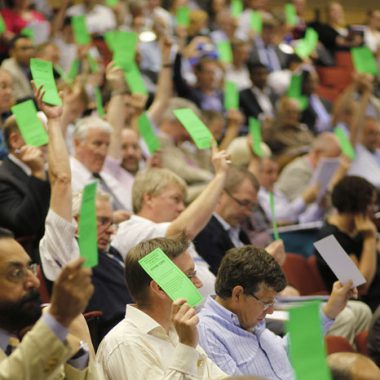Exclusive Close to half of GPs would still support mass resignation from the NHS despite the Government’s efforts to boost support to the profession since last year.
A Pulse survey of 840 GPs has found that 45% would get behind a move to quit the NHS, compared to just 29% who said they would not. Some one in four GPs said they were undecided.
The results are level with a poll conducted one year ago but this year’s results come despite the multibillion GP Forward View rescue package announced by NHS England in April 2016.
The news comes as Pulse revealed last week that the situation in general practice has actually worsened. Despite the rescue package, there was a 150% rise in patients forced to move GP practice as closures hit record levels, the exclusive investigation showed.
It also comes as GPs in Northern Ireland are preparing to quit the NHS en masse and start charging around £45 per consultation. The NI GPC has voted for practices to exit the NHS once 60% of practices have handed in their resignations, in protest at Government underfunding.
GP representatives in England voted to ballot the profession on mass resignations at an emergency LMCs conference in January 2016, and this was rubber-stamped at the May 2016 annual LMCs conference, but the GPC abandoned the plans in August last year, claiming workload concessions from NHS England.
Despite this, Pulse’s latest survey reveals that GP support for the dramatic move of leaving the NHS has stayed almost exactly the same since one year ago.
Dr Clare Morrison, a GP from Hampshire said: ‘The current state of the NHS is such that clinicians face an unacceptable risk of working beyond their indemnified hours (5 hours per session), and risk of litigation due to demand exceeding capacity.’
Dr Zishan Syed, a GP in Kent, said: ‘General practice cannot continue with the present GMS contract. It is not fit for purpose and the GPC let us all down by not following a clear mandate agreed in last LMC conference.
‘It is time to leave the NHS. Enough is enough. We should adopt a copayment model/fee for consultation used by every sane country in the world.
‘Unfunded limitless activity of GMS contract is destroying primary care and the BMA/GPC are doing nothing about this.’
A GP from the South West, who wished to remain anonymous, said: ‘I have not yet handed in my notice, am exploring other options to continue but am highly likely to resign in the next few weeks as it just is not viable for me. However the sentiment remains. I genuinely hope and believe, I do but the system is letting us all down, staff and patients alike.
‘With three children and a husband who works away – after indemnity fees and childcare, my family would be no worse off – and in many ways better off- with me at home. What a frustrating situation after years of professional training and experience. I never imagined it would get to this point.’
Dr Michael Brown, a GP from North Staffordshire noted the Government’s plans to put GP streaming servicese in all A&E departments in England.
He said: ‘The idea of solving A&E problems by using GPs proves this, in a world of surplus GPs flawed but with a GP shortage a disaster. The patients will perceive the new pathway as “want to see a GP, go to A&E”!’
But Dr Christine French, a GP on the Isle of Wight, said: ‘Mass resignation would harm patients and cause complete chaos. We do need to find some way of getting our plight across though.’
It comes as the GPC has defended its decision not to pursue mass resignations in England, with GPC chair Dr Chaand Nagpaul recently reiterating that NHS England has accepted the GPC’s Urgent Prescription for General Practice – which is what the annual LMCs conference motion had called for in order to withdraw the threat.
Would you support mass resignation from the NHS due to the current state of general practice?
Yes – 45%
No – 28.5%
Don’t know – 26.5%
The survey was launched on 3 March 2017, collating responses using the SurveyMonkey tool. The 28 questions covered a wide range of GP topics, to avoid selection bias on one issue. A total of 840 GP partners answered the question above.
















